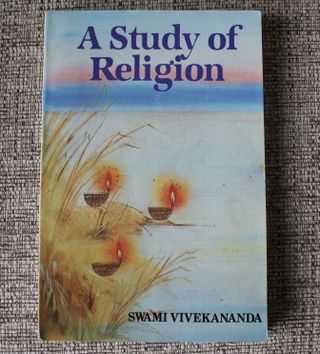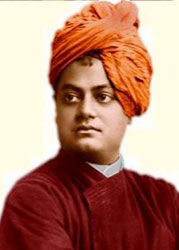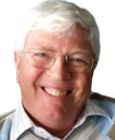Religion
What Kind of Religion is Vedanta?
The whole of nature is the worship of God.
Posted November 28, 2016

“Religion is neither talk, not theory, nor intellectual consent. It is realization in the heart of our hearts. It is touching God. It is feeling, realizing that I am a spirit, a soul, in relation to the Universal Spirit and all Its great manifestations.” 1
“The sum total of this whole universe is God Himself.” 1
These quotes summarize the gospel according to Vedanta, a religion or path of spiritual wisdom derived from the ‘Vedas’ (from the word ‘vid’: to know), the most ancient of religious texts, handed down by word of mouth in the region of the Himalayas, later written down in Sanskrit to become the bedrock of the Hindu faith, also a contributory fore-runner to Buddhism.
Vedanta’s most inspirational leader was Swami Ramakrishna (1836 - 1886), whose followers founded and still run, the Monastery of Belur Math and the Sri Ramakrishna Mission, on the west bank of the Hooghly River near Kolkata (Calcutta). His best known follower, Swami Vivekananda, attended the ‘Parliament of Religions’ held in Chicago in 1893, and made an enormous impression travelling around the USA and Europe for several years giving talks on Vedanta. Much of what follows is taken from edited versions of those talks. 2
"Unity in variety is the plan of the universe." 3 An abiding principle of Vedanta is ‘Advaita’, which means non-duality, oneness. This is hard for the normal everyday mind, fixated on duality – on subject/object; right/wrong; success/failure; us/them; either/or ways of thinking – to grasp. It means realizing (making real for oneself) that opposites depend on each other for existence and meaning, that everything and everybody are all seamlessly connected to everything and everybody else, and that everything is divine: "The whole of nature is worship of God". 4

Vedanta recognizes this and, whereas it says no-one can make people spiritual – "There is no other teacher to you than your own soul" 5 – it does offer advice and direction. Whether we know and accept it or not, we are all engaged in the same endeavour, the search for God, it says, "Who is everywhere, pure and formless, Almighty and All-merciful, our Father, our Mother, our beloved friend, the source of all our strength".6 However, each person is different, so each follows his or her own path up the mountain, so to speak, until all meet together at the summit.
Recognizing differences of character, of time, place and conditions, Vedanta also recognizes the value of different spiritual masters through the ages, and the essential harmony between the different religions, acknowledging the same truth to be at their heart. It does not claim precedence, and suggests that for other faiths to claim precedence is a divisive error.
The path to spiritual maturity is different for the active person, the worker; for the intellectual person, the philosopher; for the person sensitive to nature and beauty, the sensory-emotional person; and for the mystic, who seeks direct experience of the divine. Accordingly, Vedanta includes four types of spiritual practice under the general heading of ‘yoga’ (the word means ‘union’). Karma Yoga is the path of action, of helping others, suited to the worker. Jnana Yoga is the path of knowledge, suited to the intellectual. Bhakti Yoga is the path of devotion, of love, suited to the compassionate, sensory-emotional person. Raja Yoga (‘King’ Yoga) is the path of meditation, the most direct, suited to the mystic, the contemplative, the person capable of listening to and trusting intuition.
The way advocated by Vedanta is, ultimately, a path of self-mastery, of de-hypnotizing oneself from duality, of going beyond good and evil, fortune and misfortune, awakening to a sense of God within self and within all others too. "We have no theory of evil. We call it ignorance." 7
We are all somehow innately prepared and programmed for this life-journey to grow in wisdom and maturity. Our development will happen, gradually and spontaneously, in favourable conditions – conditions of love and learning – and in the absence of obstacles.
It takes time even to understand and fully grasp that this is the sole and all-important task before us, and even more time to make progress on our journey to truth. However, given Vedanta’s teaching about reincarnation, time is not the problem. The divine, absolute ‘Atman’ dwells within us as a soul. The Atman never comes or goes, is never born or dies. Every soul passes through a continuous round of birth and death, sooner or later to become free.
Conflict and division between and within religions, “Will cease only when people understand that religion is not in books, not in churches, temples, mosques or synagogues. It is in actual perception. Only those who have actually perceived God and the soul have religion”.8
Vivekananda makes it plain, over and over, that people are here on earth to discover freedom, and we achieve that recognition and realization through knowledge. This is not knowledge about things, but knowledge as direct and deeply personal experience of the way things are. This is, therefore, nothing less than the sacred knowledge of universal wisdom. Life is a universal cry for freedom, says Vivekananda. We want knowledge in order to make ourselves free; but so many seek satisfaction where it cannot be found, he warns; in material reality, through wealth, fame, power and the distractions of pleasure-seeking. However, the human soul can never be satisfied except by the infinite itself. Do not wait, Vedanta advises people, begin your search for ultimate freedom right now.
1 Swami Vivekananda (1990) Vedanta: Voice of Freedom. St Louis: Vedanta Society of St Louis, p 280 & p95.
2 Swami Vivekananda (1995, 11th edition) A Study of Religion. Calcutta: Advaita Ashrama.
3 A Study of Religion, p 67.
4 ibid, p 12.
5 Vedanta: Voice of Freedom, p 283.
6 ibid, p 47.
7 ibid, p 61.
8 ibid, p 86.
Copyright Larry Culliford
For information about Larry and his books ‘Much Ado about Something’, ‘The Psychology of Spirituality’, and ‘Love, Healing & Happiness’, go to Larry’s website.





